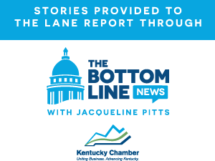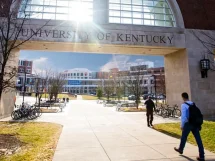Touts new national center at UofL to research automotive efficiency and sustainable transportation

FRANKFORT, Ky. (Sept. 13, 2016) — Gov. Matt Bevin yesterday addressed global automotive manufacturers, suppliers and service providers at the AutoVision Conference, held in Lexington. The second-annual, national-level event highlights emerging technology, innovation and workforce development trends within one of Kentucky’s signature industries.
Gov. Bevin’s message to the crowd of approximately 225 centered on creating a more progressive, business-friendly environment, including improving Kentucky’s workforce readiness, cutting red tape and supporting innovation that provide stability and growth for the changing auto industry.
“Kentucky is a recognized leader in the automotive-manufacturing industry. We provide companies with the business environment, innovative climate and skilled employees needed for success,” Gov. Bevin said. “We appreciate AutoVision for proactively examining the changing automotive industry and developing solutions to ensure its continued prosperity in the years to come.”
As Gov. Bevin noted, preparing to meet the industry’s future demands requires forward thinking and innovation from all stakeholders.
As a prime example of the state’s innovative spirit, Gov. Bevin announced to the group that the University of Louisville is co-founding a national center to research automotive efficiency and sustainable transportation.
“Research leads to innovation, which moves industries forward,” said Gov. Bevin. “The University of Louisville’s broad coalition of industry, higher-education and non-profit association partners will help shape the automotive industry’s future for decades to come.”
Coined EV-STS, the Industry/University Cooperative Research Center for Efficient Vehicles and Sustainable Transportation Systems will work from multiple research sites on topic areas including electric-vehicle powertrains, conventional and alternative-fuel powertrains, vehicle systems and transportation systems and infrastructure. The National Science Foundation earlier this year awarded UofL a five-year, $750,000 grant to fund its study site.
Kentucky’s automotive industry employs nearly 95,000 people at more than 500 facilities. Those include two Ford plants in Louisville, General Motors’ Corvette assembly plant in Bowling Green and Toyota’s flagship U.S. plant in Georgetown.
Hundreds of parts and assembled-components suppliers, logistics companies, service-related businesses and equipment providers populate Kentucky. Two-thirds of the Commonwealth’s counties are home to at least one automotive-related facility.
The industry contributes $14.3 billion annually to the gross state product. Motor vehicles and parts made up nearly one-fifth of Kentucky’s export total in 2015 and, through June 2016, Kentucky exported nearly $2.8 billion in vehicles and parts.
This year alone, automotive companies have announced nearly 20 new locations or expansions in Kentucky. Those projects are expected to bring more than 1,500 new jobs and nearly $600 million in new investment.
In its efforts to meet the industry’s needs, Gov. Bevin and other state officials last week announced “Kentucky Trained. Kentucky Built.” The program will expand and promote apprenticeships in all industry sectors including manufacturing companies across the state.
That effort complements the KY FAME partnership, which pairs private employers with higher education institutions to give students on-the-job experience and classroom instruction and an advanced-manufacturing degree.
The Work Ready Skills Initiative, launched in July, aims to develop a highly trained, modernized workforce in the Commonwealth to meet the needs of employers and promote sustainable incomes for Kentuckians. Local partnerships from across the state, consisting of higher-education institutions, private-industry and community and governmental organizations, have submitted more than 100 proposals for funding to establish training programs.
The Red Tape Reduction campaign, launched this summer, uses crowd sourcing to identify outdated, unnecessary state regulations that hamper business growth. With hundreds of submissions under review, Kentucky has already slashed several onerous requirements.
This year Kentucky started the state’s first-ever automotive caucus. The caucus was formed to help track legislation in the Kentucky General Assembly that further the economic interests of the Commonwealth by promoting the growth of the automotive industry.
Held this year at Lexington Center, AutoVision attracts industry executives, insiders and analysts for a two-day conference and exhibitor hall. Its world-class agenda brings together high-impact speakers to discuss and help shape the industry’s trajectory in Kentucky, the nation and across the world.
Speakers included Mustafa Mohatarem, chief economist for General Motors, and Gary Silberg, national sector lead partner with KPMG, each of whom took part in last year’s conference, as well as Jean Marie Thrower, CEO of Supplier Development Solutions.
Additionally, Gregory Haye, general manager of Local Motors; Curt Magleby, vice president of U.S. Governmental affairs at Ford Motor Co.; Alan Ewing, president and executive director of the Car Connectivity Consortium; and Paul D. Ryan, vice president of trade and competitiveness for the Association of Global Automakers, spoke.
The Kentucky Automotive Industry Association, a voice for Kentucky’s automotive industry, organized AutoVision. Learn more about the conference at http://kyautoindustry.com/AutoVision.




















Add Comment